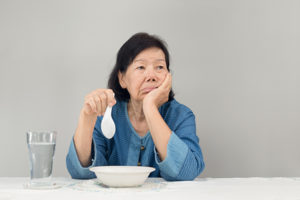April 11, 2018
 Remember weekend dinners at Grandma’s, whenever the entire family came together round the table to have a hearty meal, conversations, and laughter? Regrettably, with a lot of families now living at a distance from their older relatives, together with so many demanding needs pulling us in various directions, it’s hard to continue this tradition – and it might be one among the many factors adding to the dramatic upsurge in senior malnutrition.
Remember weekend dinners at Grandma’s, whenever the entire family came together round the table to have a hearty meal, conversations, and laughter? Regrettably, with a lot of families now living at a distance from their older relatives, together with so many demanding needs pulling us in various directions, it’s hard to continue this tradition – and it might be one among the many factors adding to the dramatic upsurge in senior malnutrition.
As many as 25% of all senior citizens within the U.S. are malnourished, leading to critical health concerns. For quite a few older adults who live alone, they simply aren’t inspired to cook properly for themselves. Others are encountering grief, depression, anxiety, cognitive difficulties, poverty, medication side effects, and more.
Regardless of the underlying factors, elderly people who are malnourished experience compromised immune systems, longer and much more complicated hospital stays, readmissions, and earlier mortality. And uncovering malnutrition isn’t as simple as observing weight loss in a senior; people who appear healthy or even overweight may also be struggling with malnourishment challenges.
One principal aspect of detecting senior malnutrition and then addressing it lies in the hands of the medical community. Seniors should be screened for nutrition issues by their primary care doctor, and a dietary plan set up. When hospitalized, hospital personnel should also consider proper nutrition for older adults, and include their findings and a prescribed course of action in discharge paperwork to be discussed with care providers together with the senior’s physician.
Loved ones also play an important role in ensuring the nutritional needs of their senior loved ones are met, and in helping to uncover the main cause if problems are discovered. As an example, if financial concerns are preventing the senior from maintaining a healthy eating plan, he or she may qualify for the Supplemental Nutrition Assistance Program. Currently, up to three out of five older adults who do quality for the program are not using its benefits.
It is crucial to pay attention to signs that your elderly loved one may possibly not be adhering to a healthy diet plan, and to discuss any concerns with the senior’s physician. And turn to Continuumfor help in establishing better nutritional habits for your senior loved one. Through our in home care in St. Louis, we are able to plan and prepare balanced meals, pick up groceries and ensure there are balanced diet options within the fridge and pantry all the time, and offer friendly companionship that makes mealtime more enjoyable. Contact us today for more information.
